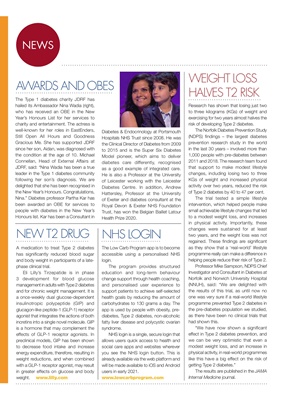
NEWS
AWARDS AND OBES
LANGUAGE
STILL MATTERS
Research has shown that losing just two
to three kilograms (KGs) of weight and
exercising for two years almost halves the
risk of developing Type 2 diabetes.
The Norfolk Diabetes Prevention Study
(NDPS) findings - the largest diabetes
prevention research study in the world
in the last 30 years - involved more than
1,000 people with pre-diabetes between
2011 and 2018. The research team found
that support to make modest lifestyle
changes, including losing two to three
KGs of weight and increased physical
activity over two years, reduced the risk
of Type 2 diabetes by 40 to 47 per cent.
The trial tested a simple lifestyle
intervention, which helped people make
small achievable lifestyle changes that led
to a modest weight loss, and increases
in physical activity. Importantly, these
changes were sustained for at least
two years, and the weight loss was not
regained. These findings are significant
as they show that a 'real-world' lifestyle
programme really can make a difference in
helping people reduce their risk of Type 2.
Professor Mike Sampson, NDPS Chief
Investigator and Consultant in Diabetes at
Norfolk and Norwich University Hospital
(NNUH), said: "We are delighted with
the results of this trial, as until now no
one was very sure if a real-world lifestyle
programme prevented Type 2 diabetes in
the pre-diabetes population we studied,
as there have been no clinical trials that
had shown this.
"We have now shown a significant
effect in Type 2 diabetes prevention, and
we can be very optimistic that even a
modest weight loss, and an increase in
physical activity, in real-world programmes
like this have a big effect on the risk of
getting Type 2 diabetes."
The results are published in the JAMA
Internal Medicine journal.
The Type 1 diabetes charity JDRF has
hailed its Ambassador Nina Wadia (right),
who has received an OBE in the New
Year's Honours List for her services to
charity and entertainment. The actress is
well-known for her roles in EastEnders,
Still Open All Hours and Goodness
Gracious Me. She has supported JDRF
since her son, Aidan, was diagnosed with
the condition at the age of 10. Michael
Connellan, Head of External Affairs at
JDRF, said: "Nina Wadia has been a true
leader in the Type 1 diabetes community
following her son's diagnosis. We are
delighted that she has been recognised in
the New Year's Honours. Congratulations,
Nina." Diabetes professor Partha Kar has
been awarded an OBE for services to
people with diabetes in the New Year's
Honours list. Kar has been a Consultant in
Diabetes & Endocrinology at Portsmouth
Hospitals NHS Trust since 2008. He was
the Clinical Director of Diabetes from 2009
to 2015 and is the Super Six Diabetes
Model pioneer, which aims to deliver
diabetes care differently, recognised
as a good example of integrated care.
He is also a Professor at the University
of Leicester working with the Leicester
Diabetes Centre. In addition, Andrew
Hattersley, Professor at the University
of Exeter and diabetes consultant at the
Royal Devon & Exeter NHS Foundation
Trust, has won the Belgian Baillet Latour
Health Prize 2020.
NEW T2 DRUG
The Low Carb Program app is to become
accessible using a personalised NHS
login.
The program provides structured
education and long-term behaviour
change support through health coaching,
and personalised user experience to
support patients to achieve self-selected
health goals by reducing the amount of
carbohydrates to 130 grams a day. The
app is used by people with obesity, prediabetes,
Type 2 diabetes, non-alcoholic
fatty liver disease and polycystic ovarian
syndrome.
NHS login is a single, secure login that
allows users quick access to health and
social care apps and websites wherever
you see the NHS login button. This is
already available via the web platform and
will be made available to iOS and Android
users in early 2021.
www.lowcarbprogram.com
A medication to treat Type 2 diabetes
has significantly reduced blood sugar
and body weight in participants of a latephase clinical trial.
Eli Lilly's Tirzepatide is in phase
3 development for blood glucose
management in adults with Type 2 diabetes
and for chronic weight management. It is
a once-weekly dual glucose-dependent
insulinotropic polypeptide (GIP) and
glucagon-like peptide-1 (GLP-1) receptor
agonist that integrates the actions of both
incretins into a single novel molecule. GIP
is a hormone that may complement the
effects of GLP-1 receptor agonists. In
preclinical models, GIP has been shown
to decrease food intake and increase
energy expenditure, therefore, resulting in
weight reductions, and when combined
with a GLP-1 receptor agonist, may result
in greater effects on glucose and body
weight. www.lilly.com
NHS LOGIN